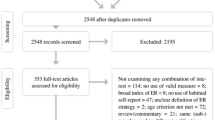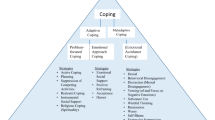Abstract
Purpose
Cognitive rumination is a transdiagnostic construct that has been increasingly studied in the context of eating disorders (EDs). While this literature has consistently linked trait-level general and ED-specific forms of rumination to ED psychopathology, it is not clear whether trait-level measures are independently related to symptoms in daily life. Therefore, the present study used ecological momentary assessment (EMA) to assess the ecological validity of trait measures of general rumination and ED-specific rumination, and assess the degree to which ruminative brooding and reflection were differentially related to relevant momentary affective, cognitive, and behavioral processes.
Methods
Forty women completed baseline measures (Ruminative Response Scale [RRS] and Ruminative Response Scale for Eating Disorders [RRSED]) followed by a 10-day EMA protocol.
Results
Generalized estimating equations indicated trait-level ED-specific rumination was related to momentary general and ED-specific rumination, and trait-level general and ED-specific rumination were related to momentary affect and concentration difficulties. Trait-level general rumination was related to momentary self-discrepancy, while higher trait-level ED-specific rumination was related to greater loss of control eating, overeating, and body dissatisfaction. Lastly, trait levels of ruminative brooding, compared to reflection, were more consistently related to maladaptive momentary symptoms (i.e., general rumination, negative affect, concentration problems, body dissatisfaction).
Conclusion
Together these findings support the ecological validity of the RRSED and identify shared and unique momentary correlates of the RRS and RRSED. Results also highlight the importance of measuring and addressing trait- and state-level ruminative processes that are both general and specific to ED psychopathology in research and clinical work.
Level of evidence
Level V, observational descriptive study.
Similar content being viewed by others
References
Nolen-Hoeksema S (1991) Responses to depression and their effects on the duration of depressive episodes. J Abnorm Psychol 100(4):569–582. https://doi.org/10.1037//0021-843x.100.4.569
Wahl K, Ehring T, Kley H et al (2019) Is repetitive negative thinking a transdiagnostic process? A comparison of key processes of RNT in depression, generalized anxiety disorder, obsessive-compulsive disorder, and community controls. J Behav Ther Exp Psychiatry 64:45–53. https://doi.org/10.1016/j.jbtep.2019.02.006
Smith KE, Mason TB, Lavender JM (2018) Rumination and eating disorder psychopathology: a meta-analysis. Clin Psychol Rev 61:9–23. https://doi.org/10.1016/j.cpr.2018.03.004
Mason TB, Lewis RJ (2017) Examining social support, rumination, and optimism in relation to binge eating among Caucasian and African–American college women. Eat Weight Disord 22(4):693–698. https://doi.org/10.1007/s40519-016-0300-x
Smith KE, Mason TB, Anderson NL, Lavender JM (2019) Unpacking cognitive emotion regulation in eating disorder psychopathology: the differential relationships between rumination, thought suppression, and eating disorder symptoms among men and women. Eat Behav 32:95–100. https://doi.org/10.1016/j.eatbeh.2019.01.003
Nolen-Hoeksema S, Watkins ER (2011) A heuristic for developing transdiagnostic models of psychopathology: explaining multifinality and divergent trajectories. Perspect Psychol Sci 6(6):589–609. https://doi.org/10.1177/1745691611419672
Watkins E (2015) Psychological treatment of depressive rumination. Curr Opin Psychol 4:32–36. https://doi.org/10.1016/j.copsyc.2015.01.020
Reilly EE, Lavender JM, Berner LA, Brown TA, Wierenga CE, Kaye WH (2018) Could repetitive negative thinking interfere with corrective learning? The example of anorexia nervosa. Int J Eat Disord. https://doi.org/10.1002/eat.22997
Stone AA, Shiffmann SS (2010) Ecological validity of patient reported outcomes. In: Steptoe A (ed) Handbook of behavioral medicine. Springer, New York, pp 99–112
Yoshiuchi K, Yamamoto Y, Akabayashi A (2008) Application of ecological momentary assessment in stress-related diseases. Biopsychosoc Med 2:13. https://doi.org/10.1186/1751-0759-2-13
Selby EA, Anestis MD, Bender TW, Joiner TE Jr (2009) An exploration of the emotional cascade model in borderline personality disorder. J Abnorm Psychol 118(2):375–387. https://doi.org/10.1037/a0015711
Martin LL, Tesser A (1996) Some ruminative thoughts. In: Wyer RS (ed) Ruminative thoughts. Erlbaum, Hillsdale, pp 1–47
Treynor W, Gonzalez R, Nolen-Hoeksema S (2003) Rumination reconsidered: a psychometric analysis. Cogn Ther Res 27:247–259. https://doi.org/10.1023/A:1023910315561
Miranda R, Nolen-Hoeksema S (2007) Brooding and reflection: rumination predicts suicidal ideation at 1-year follow-up in a community sample. Behav Res Ther 45(12):3088–3095. https://doi.org/10.1016/j.brat.2007.07.015
Cowdrey FA, Park RJ (2011) Assessing rumination in eating disorders: principal component analysis of a minimally modified ruminative response scale. Eat Behav 12(4):321–324. https://doi.org/10.1016/j.eatbeh.2011.08.001
Mason TB, Smith KE, Engwall A et al (2019) Self-discrepancy theory as a transdiagnostic framework: a meta-analysis of self-discrepancy and psychopathology. Psychol Bull 145(4):372–389. https://doi.org/10.1037/bul0000186
Whitmer AJ, Gotlib IH (2013) An attentional scope model of rumination. Psychol Bull 139(5):1036–1061. https://doi.org/10.1037/a0030923
First M, Williams JBW, Karg RS, Spitzer RL (2015) Structured clinical interview for DSM-5—Research version (SCID-5 for DSM-5, research version; SCID-5-RV). American Psychiatric Association, Arlington
American Psychiatric Association (2013) Diagnostic and statistical manual of mental disorders, 5th edn. American Psychiatric Association, Washington, DC
Radloff LS (1977) The CES-D Scale: a self-report depression scale for research in the general population. Appl Psychol Meas 1:385–401. https://doi.org/10.1177/014662167700100306
Radloff LS (1991) The use of the Center for Epidemiologic Studies Depression Scale in adolescents and young adults. J Youth Adolesc 20(2):149–166. https://doi.org/10.1007/BF01537606
Moberly NJ, Watkins ER (2008) Ruminative self-focus and negative affect: an experience sampling study. J Abnorm Psychol 117(2):314–323. https://doi.org/10.1037/0021-843X.117.2.314
Ruscio AM, Gentes EL, Jones JD, Hallion LS, Coleman ES, Swendsen J (2015) Rumination predicts heightened responding to stressful life events in major depressive disorder and generalized anxiety disorder. J Abnorm Psychol 124(1):17–26. https://doi.org/10.1037/abn0000025
Selby EA, Kranzler A, Panza E, Fehling KB (2016) Bidirectional-compounding effects of rumination and negative emotion in predicting impulsive behavior: implications for emotional cascades. J Personal 84(2):139–153. https://doi.org/10.1111/jopy.12147
Thompson ER (2007) Development and validation of an internationally reliable short-form of the positive and negative affect schedule (PANAS). J Cross Cult Psychol 38(2):227–242. https://doi.org/10.1177/0022022106297301
Berg KC, Crosby RD, Cao L et al (2013) Facets of negative affect prior to and following binge-only, purge-only, and binge/purge events in women with bulimia nervosa. J Abnorm Psychol 122(1):111–118. https://doi.org/10.1037/a0029703
Peterson C, Engel S, Crosby RD, Crow S, Smith T, Klein M, Mitchell J, Strauman T, Cao L, Erickson A, Bjorlie K, Wonderlich SA (2019) A randomized comparison of ICAT-BED and CBT-GSH to treat binge eating disorder using standard and naturalistic momentary outcome measures. Paper presented at the Annual Meeting of the Eating Disorders Research Society, Chicago, IL (under review)
Benjamini Y, Drai D, Elmer G, Kafkafi N, Golani I (2001) Controlling the false discovery rate in behavior genetics research. Behav Brain Res 125(1–2):279–284. https://doi.org/10.1016/s0166-4328(01)00297-2
McDonald JH (2014) Handbook of biological statistics, 3rd edn. Sparky House Publishing, Baltimore
Johnson DP, Whisman MA (2013) Gender differences in rumination: a meta-analysis. Personal Individ Differ 55(4):367–374. https://doi.org/10.1016/j.paid.2013.03.019
Funding
This study was funded in part by the National Institute of Mental Health (T32MH082761).
Author information
Authors and Affiliations
Corresponding author
Ethics declarations
Conflict of interest
The authors declare that they have no conflict of interest.
Ethical approval
All procedures performed in studies involving human participants were in accordance with the ethical standards of the institutional review board (Sanford IRB CR00000857) and with the 1964 Helsinki declaration and its later amendments or comparable ethical standards.
Informed consent
All participants provided informed consent, and study procedures received IRB approval.
Additional information
Publisher's Note
Springer Nature remains neutral with regard to jurisdictional claims in published maps and institutional affiliations.
This article is part of topical collection on Personality and eating and weight disorders.
Rights and permissions
About this article
Cite this article
Smith, K.E., Schaumberg, K., Reilly, E.E. et al. The ecological validity of trait-level rumination measures among women with binge eating symptoms. Eat Weight Disord 26, 181–190 (2021). https://doi.org/10.1007/s40519-019-00838-x
Received:
Accepted:
Published:
Issue Date:
DOI: https://doi.org/10.1007/s40519-019-00838-x




